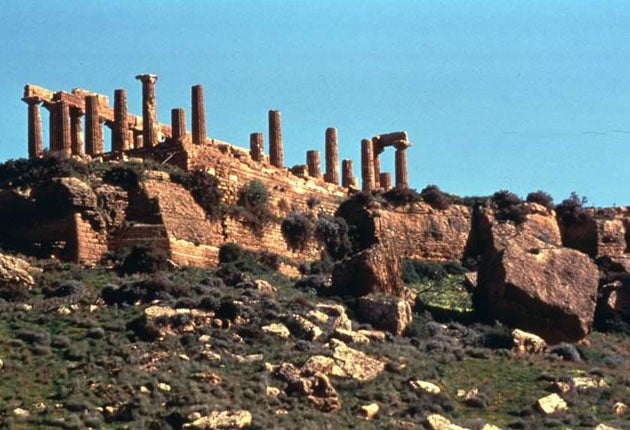Gas plant to overshadow Greek temples
Italy gives go-ahead to storage depot less than a mile from World Heritage Site

Your support helps us to tell the story
From reproductive rights to climate change to Big Tech, The Independent is on the ground when the story is developing. Whether it's investigating the financials of Elon Musk's pro-Trump PAC or producing our latest documentary, 'The A Word', which shines a light on the American women fighting for reproductive rights, we know how important it is to parse out the facts from the messaging.
At such a critical moment in US history, we need reporters on the ground. Your donation allows us to keep sending journalists to speak to both sides of the story.
The Independent is trusted by Americans across the entire political spectrum. And unlike many other quality news outlets, we choose not to lock Americans out of our reporting and analysis with paywalls. We believe quality journalism should be available to everyone, paid for by those who can afford it.
Your support makes all the difference.They are among the finest survivors of ancient Greek civilisation in the Mediterranean: a line of imposing Doric temples on the southern coast of Sicily which have been listed as a Unesco World Heritage site since 1997.
But now the Italian government plans to build a huge liquid gas terminal less than a mile away from the famous Agrigento site, to the fury of environmentalists.
The site is protected by environmental laws, but the effect of these has been cancelled by the simple act of stating that the heritage site does not exist, according to Carlo Vulpio, the Corriere della Sera journalist who has been spearheading the environmentalists' fight back. Mr Vulpio disclosed yesterday that a ruling signed into law on 28 September by the Environment Minister, Stefania Prestigiacomo, backed by the Culture Minister, Sandro Bondi, stated that the planned €500m (£420m) plant "does not infringe on the special protected zone at a community level, inasmuch as the closest affected district is between 13 and 20km from the area of the planned development."
Thanks to this claim, the project has now obtained the all-important "environmental impact assessment" go-ahead from the ministerial commission in charge of these questions, on the grounds that it will not impact on sites of importance to the community. "It's therefore a pity," writes Mr Vulpio, "that at less than 1km (and not 13 or 20) from the point at which they want to realise the project, which consists of two holding tanks, each of 160,000sq m, 47m high and 72m across, plus the 40m-high flame tower, is to be found the Archaeological Park of the Valley of the Temples."
The Valley was awarded World Heritage Site status in 1997. It was founded as a Greek colony in the 6th century BC. "Its supremacy and pride," says Unesco, "are demonstrated by the remains of the magnificent Doric temples that dominate the ancient town, much of which still lies intact under fields and orchards. Its... row of Greek temples is one of the most outstanding monuments of Greek art and culture."
At the Valley of Temples page on Unesco's website, the file "Threats" is empty. But the menace posed by the terminal, to be built by Enel, Italy's national energy corporation, is lively enough that Unesco's Japanese director-general, Koichiro Matsuura, plans to visit the site tomorrow to make a first-hand assessment.
The Agrigento temples are set amid rolling hills with a commanding view over the sea, but the Mafia is a powerful force here. Environmentalists have for years been sounding the alarm over the rash of legal and illegal apartment blocks and hotels sprouting perilously close to the monuments. Back in 2002, Unesco was sounding the alarm about these developments. One official told Reuters: "The proliferation of illegal building growing up around Agrigento makes you think a bomb wouldn't be a bad solution." Opponents of the new liquid gas terminal believe the legislative sleight of hand which enabled the project to hoodwink the environmental assessment risk commission was thanks to the Mafia's ability to "oil the wheels" of government.
Now, however, critics hope that the self-evident outrageousness of building a major industrial facility a few minutes' walk from a world-famous Unesco site is gradually dawning on the island's politicians. The EU's Culture Commissioner Stavros Dimas has asked the Sicily region to furnish "urgent clarification" about the project, and now the Mayor of Agrigento, Franco Zambuto, and president of the park's ruling body, Rosalia Camerata Scovazzo, have agreed to challenge the project "in every court in the land".
Join our commenting forum
Join thought-provoking conversations, follow other Independent readers and see their replies
Comments